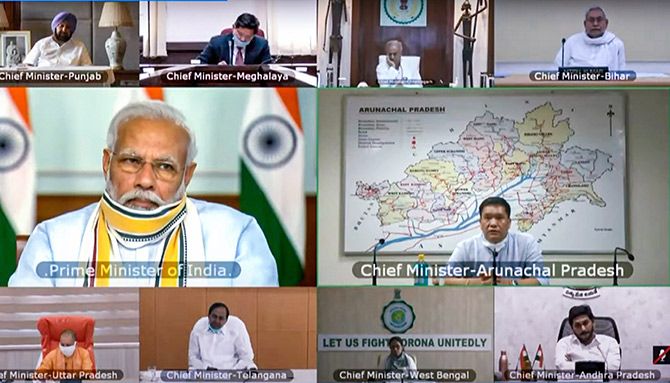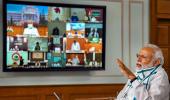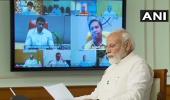'The spirit of cooperation between the Centre and states has been diluted in many ways.'
'The level of consultation which used to be there earlier has reduced significantly.'

"We have seen the federal structure of the nation, which is a key constituent of the Constitutional framework, come under stress in recent months," Punjab Chief Minister Captain Amarinder Singh tells Archis Mohan and Sanjeeb Mukherjee.
What is the assistance Punjab expects from the Centre?
We are in the midst of an unprecedented crisis and unfortunately the central government has not so far come out with any special relief package to help us despite our repeated requests.
We are in the second month of the nationwide lockdown. Revenue sources have completely dried up.
Punjab's revenue shortfall in April was 88 per cent. Against the estimated revenue of Rs 3,360 crore, only Rs 396 crore was received.
There are critical issues facing us, including handling transportation of lakhs of migrants, completing harvest and procurement on time, supporting poor and needy, and above all, combating the spread of the pandemic.
Then there are lakhs of corona warriors who need our support in addition to the routine regular expenses of the government.
And the bottom line is we have no money, and only the Centre can come to our rescue.
We want the Centre to immediately clear our pending GST arrears of Rs 4,365.37 crore.
It should, in addition, provide revenue grant to meet the revenue shortfall. We need support to ramp up our medical and healthcare facilities to tackle the pandemic, particularly testing facilities.
Some have bemoaned erosion of the powers of states in recent months. Do you think there is a concern of weakening of federalism?
Unfortunately, yes.
We have seen the federal structure of the nation, which is a key constituent of the Constitutional framework, come under stress in recent months.
The spirit of cooperation between the Centre and states has been diluted in many ways.
The level of consultation which used to be there earlier has reduced significantly.
Lots of major decisions have been taken by the central government in recent past without taking the will of the states into account, even on matters that directly impacted the states.
Though every state supported the central government's decision to impose a national lockdown in March as the right and best decision in the circumstances, the fact remains that it was done without consulting the states.
The erosion of the fiscal powers of the states is another issue of concern.
With the goods and services tax coming into play, the states were left with no fiscal options and all powers were vested in the Centre.
Under the new regime, the Centre has the first right on the GST collections.
In fact, the Centre has total powers not to distribute funds that remain after all central expenditures are met, when in fact it should be the other way round.
Further, Constitutional powers of the states to levy fee and cess have been withdrawn.
These funds collected by the Centre are not kept as part of the divisible pool, but are completely retained by the central government.
This has caused cooperative federalism to come under massive stress.
The fiscal crisis faced by the states especially in the light of the pandemic could lead to serious problems between the Centre and states going forward unless some Constitutional remedy is found.
How do you view the new rules of the Union government and its officials sitting in New Delhi classifying districts into green, orange and red zones?
Frankly, it is illogical for officials sitting in New Delhi to undertake this exercise. After all, they are not familiar with the nuances of each district in each state.
How can they possibly know which ward or village in which district is affected, and to what extent!
Putting an entire district in red zone makes no sense when it is a small pocket that is badly affected; or it is an area that can easily be fenced and isolated from the rest of the district without any significant effect on the whole district.
Similarly, you could end up with a green district that has scattered pockets of widespread infection which cannot be completely separated without risking the unaffected areas.
Frankly, this is a decision best left to the district collectors and senior superintendents of police/commissioners of police on the ground who know their districts better than anyone.
With migrants leaving, how would the state ensure that labour shortage does not impact the forthcoming kharif growing season and ensure availability of labour for industry?
We do not foresee a major problem in kharif cultivation since we have sufficient rural labour in the state to support agricultural operations, as we saw in the rabi harvesting and procurement season.
In any case, we have been increasingly shifting away from paddy and my government has already decided to shift another 2.5 lakh hectares to alternate crops this year (last year paddy cultivation took place over 29.30 lakh hectares).
So the pressure on paddy cultivation will reduce further.
Also, a new method of paddy sowing, called Direct Seeding of Rice, has been recommended by the Punjab Agricultural University, Ludhiana, and we propose to bring five lakh hectares under the system, which does not require intensive labour.
I am confident that with the active involvement of farmers, we shall be able to plant paddy by the target date of July 30, 2020.
How will the state ensure that farmers who shift to maize or cotton from paddy during the kharif season get adequate return on their investments?
Look, the farmer will sow what gives him good returns. So, as long as we can assure him of sufficient returns on his investment in maize and other alternate crops, he will be ready to make the shift.
Maize is used both as fodder and grain in the state. A large number of fodder-baled silage units have come up in Punjab, which take maize crop from the farmers at reasonable price and turn it into baled silage.
This is then used as fodder in various states in India as well as abroad. There are many animal feed units in Punjab, which use maize grain as a major raw material.
The grain-based distilleries are also being roped in to purchase maize for converting it into ethanol.
In addition, we have set up two specialised food parks where the maize will be used as starch and a processed food item.
We have already decided to double the area under maize cultivation this year. I have asked the concerned department to ensure abundant supply of certified varieties of maize seed duly approved by the Punjab Agricultural University to the farmers.
It is all about making the shift to maize and attractive proposition for the farmers, and we are taking several proactive measures to do that.
We are doing that with cotton too, and that is being grown this year on five lakh hectares of land in Punjab as against 3.9 lakh hectares last year.
Even though there is a strong mechanism of private trade procuring cotton in the state, the Cotton Corporation of India is also engaged in procurement at minimum support price.
Punjab really cannot afford to continue with its wheat-paddy cycle, given the severe water crisis we are facing.
Our depleting groundwater levels make it impossible for us to go for large-scale cultivation of the water-guzzling paddy crop, which is no longer proving to be lucrative for the farmers.












 © 2025
© 2025